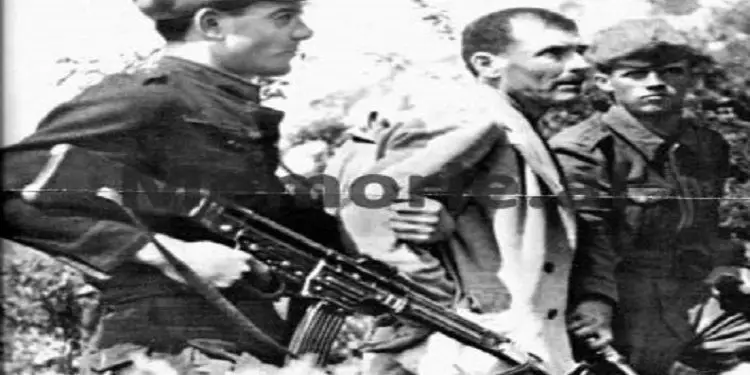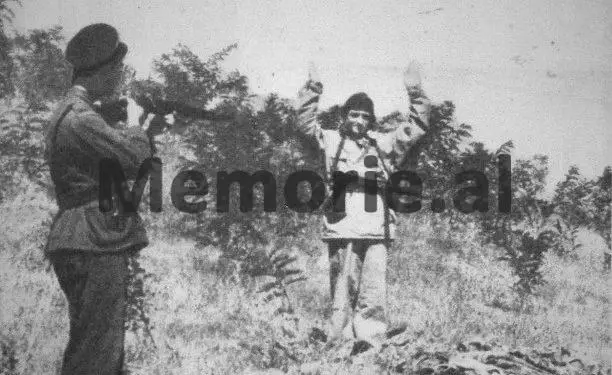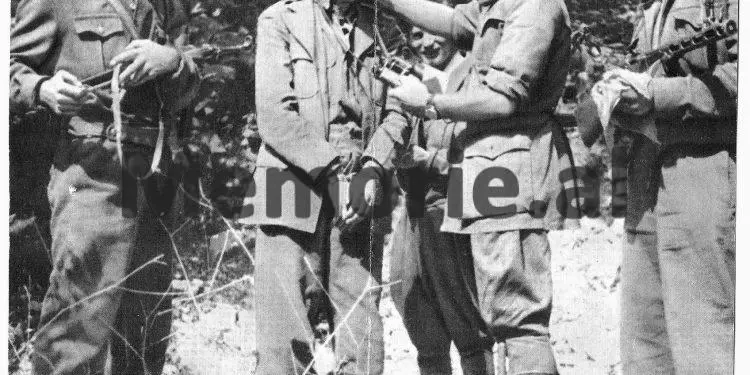Memorie.al/“A very limited intelligence service in terms of capability… and even very naive in some aspects, some of its agents are truly stupid.” This was the opinion of a new recruit about his colleagues in the British secret service at the beginning of World War II. He continued to say without reservation: “There were young metropolitan gentlemen there, whose education had been expensive rather than profound, and who were recruited in the bars of ‘White’s and Boodles,’ and there was an ex-Indian policeman…! It was not distinguished by any particular class in the giving of ideas. The predecessor had heard little talk about it; while his successor saw them more as subversives.”
I spent many months of my time last year writing my novel titled “Restless – the story of a young woman” (in Albanian: Nuk gjen qetësi – historia e një gruaje të re), working and digging deep into the archives of the British espionage “business” – and I found some analyses or ideas that lend themselves to unraveling this idea.
Not so much because the organization he describes there was weak, but because there were at least five British double agents serving the Soviets. Their names are: Guy Burgess, Donald Maclean, John Cairncross, Anthony Blunt, and the super-famous agent Kim Philby, whose rise through the ranks of the British secret services resulted in him being tasked with organizing the most important post-war operations, thus earning him the nickname “C.”
It must have been a great success for Moscow to be able to recruit such important names within the ranks of the British secret services. And this was achieved to some extent perfectly for them.
In his confessions and reflections, the author of the book, William Boyd, says: While I was busy collecting facts and writing my novel, I became curious about this phenomenon that had occurred with the British double agents and sought to find reasons for what united them, besides the betrayal they committed against their homeland.
All of them belonged to the middle, or upper-middle classes, were all well-educated with solid professional careers and “vetted” in the highest institutions of the state. They were members of an “establishment,” and in every matter, their curriculum, their core values, their speeches, the clubs they frequented, their clothing, the free time they spent, and their endless pleasures, made you think that this could never happen.
There was nothing visible on the surface to make you believe that they were different from the thousands of other privileged people in society, educated at “Oxford” and “Cambridge,” who worked in the offices of the “Foreign Office,” or in diplomatic services around the world and BBC sections. And yet, some of them consciously chose to become agents in the service of others and thus betray their homeland, the British Kingdom.
There might also be a reason to believe that in the 1930s, when their first recruitments on behalf of the Soviets occurred, the ideological appeal of communism at the time presented the only alternative to what seemed to have already taken its revenge in Europe: fascism.
Even more, the author adds, I have noticed during my studies that the duplicity of these people also came as a result of the failures of their missions and falling into despair, clashing with and being accused of incompetence by their superiors (except Philby) – I began to feel that ideological zeal simply cannot explain all those years of their double life and fatal dubiousness.
There must have been some other motive, not just the “attraction to communism” – especially after the devastating shock of the Soviet-Nazi pact of 1939. As soon as Stalin and Hitler became allies, only the most perverse minds at the time could still believe that there was a single and true enemy, namely fascism. From then on, the Soviet Union was also an enemy.
The tortures of double thoughts in the British Communist Party (CPGB) are found in two directions in this aspect. “The Daily Worker,” their party’s newspaper, was more than pacifist and anti-Nazi, but after the 1939 pact, almost all the momentum of criticism against Hitler in that newspaper was extinguished.
Then, when Hitler invaded Russia in June 1941, the CPGB thus became anti-Nazi again. No intelligence person could take such a policy of turning from an agent of one country to another so seriously. All the more so that these “British traitors” lived in a society where democracy flourished and each of them benefited from the privileges offered to their well-educated elite.
They were not compelled or begged to do such a thing, nor were they victims of state corruption repression, nor had they encountered obstacles in fulfilling their ambitions, blocked at every step of theirs – so why did they choose to betray then?
The case of Kim Philby is perhaps the most interesting of them. Philby was a man like everyone else in a purely human sense, and very capable professionally, and thus enjoyed the respect of all – competent and diligent, decorated after the war – and a kind and sociable colleague and workmate. His wife saw him as “an excellent husband” and classified their marriage as “perfect.”
He had made a career in the highest hierarchical layers of the British secret services within 10 years, between 1941-1951, without raising even the slightest shadow of doubt about his activity in the service of the Soviets. Hugh Trevor-Roper (the author of the judgment with consequences on his colleagues mentioned above), knew Philby during the war years and described him as “an extraordinary person: extraordinary for his virtues, for his displayed intelligence, sophisticated, and even realistic.”
In 1951, after the flight of Burgess and Maclean to Moscow, Philby was forced to resign from his job in the secret service, out of pity for his colleagues, as he had been a close friend of Burgess, a friendship he refused to end. He was even seen as a symbol of dedication and social loyalty.
He did not rise to protest against the judgment, and then he was reinstated in the secret service after a few years, in a smaller role (in Beirut) before finally escaping to Moscow in 1963 – most likely because a Soviet agent was very close to discovering his true identity.
No one really knew how many deaths, tortures, and imprisonments Philby was responsible for. Their number, most likely, ran into the hundreds. For example, British agents and couriers sent to Albania and Ukraine to organize anti-communist uprisings and revolutions after the war were all exposed and captured, and as a result, were executed thanks to warnings and signals coming from Philby.
In Washington, in the late 1940s, he passed all the secret materials that crossed his desk to the Russians – the most useful analyses on America’s nuclear capabilities. One could argue that Philby’s information was instrumental in igniting the Korean War and the Cuban Missile Crisis. He was an extremely effective and important double agent.
Trevor-Roper was truly surprised (how surprised I was) when he realized that he had to reconsider Philby’s character and thus try to fight with the fact that his friend had been a traitor. He wrote a series of articles in the 1960s, after Philby’s final departure for Moscow, analyzing this issue in depth.
How could a man like Philby turn into such a successful traitor? How could anyone he met during those years trust him? How could he be so loyal to such a brutal and tyrannical state as Stalin’s Russia?
Seeking answers to these questions, Trevor-Roper worked out a thesis that has actually enjoyed a lot of resonance and was related to the idea that communism had created in Philby a form of “death or numbness of the brain,” that he “had drunk from the drugged chalice with sick ideas of a secret church.” “I just don’t swallow all this, because, moreover, Philby was not alone,” – emphasizes the author of the most recent publication in Great Britain that deals with the “Philby & Co.” issue.
Are we willing to accept that the other four British traitors (double agents) also swallowed rations from “this chalice with drugs” and tolerated this so-called “death of the mind”? Maybe only one of them could have, but certainly not all five. I think the answers to this particular British state issue are found elsewhere.
Seeking an explanation, I created a traitor of Philby’s style in my novel, but a man who is never exposed like Philby, and in doing so, I had to consider all the reasons why such a positive and lucky character in his homeland would try so hard to betray it.
There, it seems to me, emphasizes the author William Boyd, there are two debatable reasons that explain the behavior of these British traitors and in particular that of Philby. The first can be summed up in the famous sentence: “If you have been a spy once, you always remain one.” Even if ideological zeal takes you with it and turns you into a double agent, it would be very difficult when that zeal dies, or when it is replaced with a clearer, more pragmatic vision that pushes you to get out of it.
Not only because this is a matter of potential carved strongly in the mind (it is very difficult to surrender as a traitor) but then it becomes, in other words, let’s say “a habit of the mind,” a double life that seems more than natural to guide a person in life. There are many reasons why people betray their country. One can be revenge, or a subcategory related to revenge that is more accurately called “hatred.”
Conscious betrayal of your country means a kind of hatred for your country, and in the example given by Blunt; we can get a more accurate idea of the extraordinary career and personality of Kim Philby. Philby himself, when interviewed by a British newspaper after his departure to Moscow in 1963, said that he saw himself as an “irreversible and complete Englishman and that England was a wonderful country.”
Asked why he then betrayed this wonderful country, he said he adhered to the idea of a “human contempt,” for “some temporary phenomena that prevented England from being her.” This is also the fundamental statement that explains Philby’s betrayal of his own country, and furthermore the use of the term “England” and “Englishman,” which is very common – the language of not reflecting on the system. Here is also the connection with Philby’s wavering and persistent, successful, and unexpected movement.
He calls it “human contempt,” but I think “contempt” would be more appropriate. With his “unsullied” self-confidence, he sees the wealth and sanctification of the world into which he was born (let’s remember once again the harsh judgment that Trevor Roper once made of his superiors and friends) and discovers that he (Philby) felt nothing but contempt for it now. In such circumstances, it is sometimes much easier to hate your country than to love it.
So what did a man named Kim Philby do in such a situation, when he was there and felt a growing sense of contempt? What options exist? Exploitation to the last point, refusal, surrender, a form of departure, escape, or even betrayal? Philby and his privileged traitor friends nevertheless made their own choice at the time. / Memorie.al
William Boyd’s new novel, “Restless” (in Albanian: “Nuk gjen qetësi”), was published in 2006 in Great Britain.
















